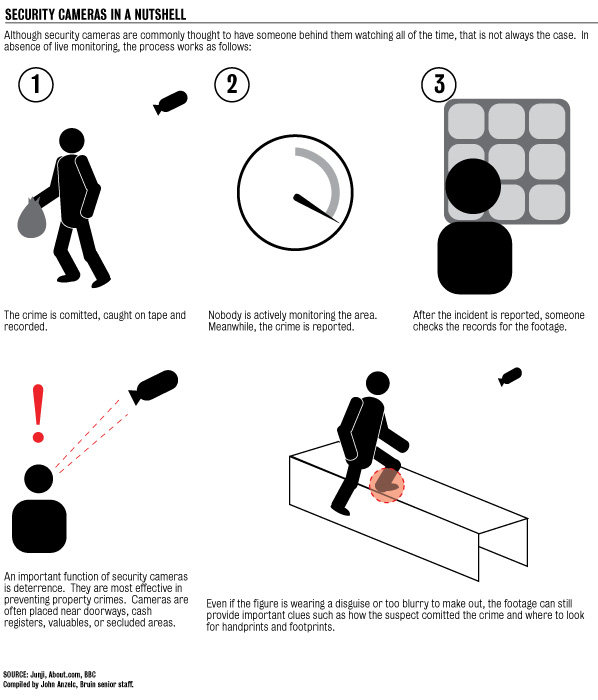Students shopping in the UCLA Store may not know that someone could be watching them on a TV monitor in the back room as they sift through clothing, choose a planner or shoplift a computer lock.
The use of about 200 security cameras in the Associated Students UCLA facilities means constant recorded surveillance of property and individuals, said Chet Cohen, manager of ASUCLA Security & Loss Prevention.
On a campus as big as UCLA’s, ensuring the security of people and university property can be a daunting task. Security cameras help lessen the burden on employees and put students and faculty at ease.
“A company who doesn’t have cameras is putting itself in a bad position,” Cohen said. “We’ve done a really good job of upgrading security and decreasing (the store’s losses) over the last ten years. I think the cameras are very effective.”
ASUCLA represents one of the many departments around campus that utilize cameras as one component of their security efforts.
“Individual entities may use cameras as part of security for various reasons,” said Nancy Greenstein, director of Police Community Services at the UCLA police department. She added that though the university police department occasionally uses footage from campus security cameras as part of investigations, UCPD itself does not install or control a campus-wide system of cameras.
“They are certainly there but it’s not centralized,” Greenstein said.
On-campus housing installed about 150 cameras throughout its public areas to protect against theft and monitor the entrances and exits to the buildings, said Alfred Nam, associate director of the Rooms Division of UCLA Housing and Hospitality.
“Our main concern is to put them in public areas like lobbies so that we can see people coming in and leaving,” he added. “We do not have any cameras on residential floors, nor do we have cameras that can look into resident floors or rooms, for the obvious privacy reasons.”
Nam also said the security department gathers statistics to determine trends in crime and the best locations to place the cameras.
“If there’s something we think can be helped or reduced by placing a camera, we will,” he added.
Nam said that his department installed cameras to monitor the lockers outside the residential dining halls after receiving reports of theft of backpacks and laptops from those areas.
He added that though he is not certain that he can attribute a direct reduction in theft to the use of cameras, he feels they have been effective and hopes they will continue to serve as visible deterrents to property crimes.
The ASUCLA cameras, which are primarily located in critical areas of stores and restaurants, such as in the vaults, store rooms and above cash registers, protect the association against internal and external theft, Cohen said.
“Internal theft is a more significant problem because the average employee has more access to clothing or money,” he added. “All of our cameras are plainly seen, which I believe is hopefully a deterrent from wrongdoing.”
Cohen said that ASUCLA cameras record digital footage 24 hours a day, seven days a week so that staff can review footage from any time.
If the store decides to prosecute an individual for shoplifting, the recorded images can be used in police investigations or court hearings, he added.
“The video doesn’t lie,” Cohen said.
ASUCLA security measures also include live monitoring of the camera data and the use of in-store security officers and plainclothes student detectives, Cohen said.
“We randomly and actively review them on our own to be more proactive,” he added. “The store has every right to protect itself.”
The protocol for the on-campus housing facility cameras’ use is not identical to that of ASUCLA cameras.
Unlike ASUCLA cameras, there is no live monitoring of the housing cameras, Nam said. They play back the footage if there is an incident, he added.
Nam cited liability as one of the reasons for the absence of live monitoring. “If we’re watching something live, we’re responsible. We have decided not to incur the cost or liability of live monitoring.”
Not all agree with the somewhat controversial notion of camera surveillance, but many feel it can be beneficial.
“People might not appreciate the constant watch, but it’s an added security measure,” said Andy Hattala, a fourth-year resident assistant in Hedrick Hall. “I’ve known individuals that have had their property stolen from the lockers, and the police were not able to do anything because they had no witnesses and no evidence. Hopefully the security cameras will help to lower incidences of crime.”
Christine Bonthius, another fourth-year resident assistant in Hedrick Hall, also said she feels the cameras would be especially effective in preventing crimes from occurring when there aren’t many witnesses.
“People often have this mentality of, “˜This won’t happen to me,’ but it happens,” Bonthius added. “There are a lot of things that you can do to prevent yourself from being in a situation where your stuff might get stolen, but not enough people know about it or take the initiative to do something about it. Unfortunately, having cameras is a good idea.”
